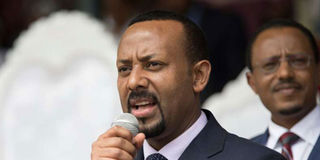Ethiopian PM rejects international 'interference' in Tigray conflict

Ethiopian Prime Minister Abiy Ahmed.
Ethiopian Prime Minister Abiy Ahmed on Wednesday rejected more calls for dialogue over the Tigray conflict, terming continued pressure to de-escalate as outside interference.
In a statement, Dr Abiy said anyone interested in resolving the issue should wait for Addis Ababa to formally make a request, effectively blocking any mediation.
His government has been running a military operation in the northern parts of the country, pursuing fighters allied to the Tigray People’s Liberation Front which he accuses of treason. But the fighting, which has caused as many as 40,000 refugees into Sudan as well as nearly a 1000 dead, has seen the international community call for dialogue to resolve the conflict.
On Tuesday, the matter reached the UN Security Council, but members disagreed right in the middle, with African representatives rejecting the idea of a session on Tigray.
Special envoys
Diplomats from South Africa, Tunisia and Niger argued they needed to consult with the African Union, which last week appointed three envoys to resolve the issue.
Dr Abiy rejected them. On Wednesday, he seemed to close the same door on the UN and other partners, even as the 72-hour amnesty given to the TPLF neared expiry. “While we consider the concerns of our friends, we reject any interference in our internal affairs,” Abiy said. “We therefore respectfully urge the international community to refrain from any unwelcome and unlawful acts of interference and respect the fundamental principle of non-intervention.”
Dr Abiy has said the ‘final phase’ of the crackdown on TPLF fighters, targeting their capital in Makelle, will be launched after the expiry of a three-day amnesty on Wednesday. The TPLF leader Debretsion Gebremichael, however, rejected the amnesty, saying his people are ‘ready to die’ for their land.
But the country’s Western allies; Germany, UK, US and the European Union had all asked Addis Ababab to give dialogue a chance. A statement from the US National Security Council on Tuesday indicated that Washington supports the AU move to send special envoys to Addis Ababa. “The US calls for mediation in Ethiopia and supports the efforts led by President Cyril Ramaphosa and the AU to end this tragic conflict now,” the Council said.





